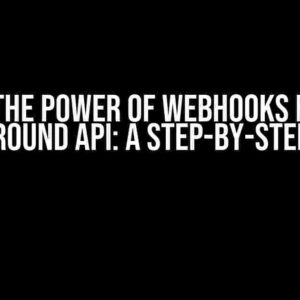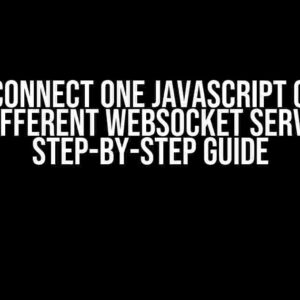As a NodeJS developer, you’re no stranger to the world of webhooks. These magical bits of code allow your application to receive real-time notifications from external services, enabling seamless integrations and automations. But, let’s face it – handling webhooks can be a daunting task, especially when it comes to scheduling and managing them efficiently. That’s where a fully managed webhook scheduling service comes in!
What is a Fully Managed Webhook Scheduling Service?
A fully managed webhook scheduling service is a solution that takes care of the entire webhook lifecycle, from reception to processing, allowing you to focus on what matters most – building your application. These services provide a robust infrastructure to handle webhook requests, retries, and failures, ensuring that your application remains scalable and reliable.
Benefits of Using a Fully Managed Webhook Scheduling Service
- Reduced Complexity: No more worrying about implementing webhook handlers, retry logic, and error handling. Let the experts handle it for you!
- Increased Reliability: Ensures that webhooks are processed correctly, even in the event of failures or network issues.
- Scalability: Handles high volumes of webhook requests without breaking a sweat, so you can focus on growing your application.
- Improved Security: Provides enterprise-grade security features to protect your application from potential threats.
How to Choose the Right Fully Managed Webhook Scheduling Service for Your NodeJS Application
With so many services available, selecting the right one can be overwhelming. Here are some key factors to consider:
1. Compatibility with NodeJS
Make sure the service has native support for NodeJS and provides a seamless integration experience. Look for services that offer NodeJS SDKs or libraries to simplify the integration process.
const sdk = require('webhook-sdk');
sdk.init({
apiKey: 'YOUR_API_KEY',
apiSecret: 'YOUR_API_SECRET'
});
sdk.webhooks.create({
url: 'https://example.com/webhook',
events: ['example.event']
});2. Webhook Request Handling
The service should be able to handle webhook requests efficiently, including retries, timeouts, and failures. Ensure that the service provides robust logging and analytics to help you debug issues.
| Feature | Service A | Service B |
|---|---|---|
| Retries | 3 attempts with 30-second intervals | 5 attempts with 1-minute intervals |
| Timeouts | 30 seconds | 1 minute |
| Logging | Basic logging with request/response data | Detailed logging with request/response data, headers, and body |
3. Security and Compliance
The service should provide enterprise-grade security features, including encryption, access controls, and compliance with industry standards.
- Encryption: Look for services that use end-to-end encryption to protect webhook requests.
- Access Controls: Ensure the service provides role-based access controls to restrict access to webhook configurations.
- Compliance: Check if the service is compliant with industry standards like GDPR, HIPAA, and PCI-DSS.
4. Scalability and Performance
The service should be able to handle high volumes of webhook requests without impacting performance. Look for services that provide autoscaling, load balancing, and distributed architectures.
- Autoscaling: The service should automatically scale to handle sudden spikes in webhook requests.
- Load Balancing: Ensure the service distributes webhook requests across multiple instances to prevent bottlenecks.
- Distributed Architecture: Look for services that use distributed architectures to process webhook requests in parallel.
5. Pricing and Support
Consider the pricing model and support options provided by the service. Look for services that offer flexible pricing tiers, free trials, and responsive customer support.
Service A:
- Free plan: 100 webhook requests/month
- Pro plan: $10/month (1000 webhook requests/month)
- Enterprise plan: Custom pricing for high-volume usage
Service B:
- Free trial: 30 days
- Basic plan: $5/month (100 webhook requests/month)
- Pro plan: $20/month (1000 webhook requests/month)Top Fully Managed Webhook Scheduling Services for NodeJS
Based on our research, here are some top fully managed webhook scheduling services that support NodeJS:
- Zapier: A popular automation tool that provides a robust webhook scheduling service with NodeJS support.
- Moonwalk: A fully managed webhook scheduling service that provides native NodeJS support and a free trial.
- Reliable Webhooks: A robust webhook scheduling service that provides enterprise-grade features and NodeJS support.
Conclusion
Implementing a fully managed webhook scheduling service can be a game-changer for your NodeJS application. By choosing the right service, you can reduce complexity, increase reliability, and improve security. Remember to consider factors like compatibility, request handling, security, scalability, and pricing when selecting a service. With the right tool in your arsenal, you can focus on building a scalable and efficient application that delights your users.
So, what are you waiting for? Start exploring fully managed webhook scheduling services today and take your NodeJS application to the next level!
Here are 5 Questions and Answers about “Looking for a fully managed webhook scheduling service to use with NodeJS”:
Frequently Asked Question
Get answers to your questions about finding the perfect webhook scheduling service for your NodeJS project.
What is a fully managed webhook scheduling service, and why do I need it for my NodeJS project?
A fully managed webhook scheduling service is a third-party solution that handles the complexity of webhook management, including scheduling, retries, and error handling, allowing you to focus on building your NodeJS application. You need it to ensure reliable and efficient delivery of webhooks, which is crucial for your application’s functionality and user experience.
What are the key features to look for in a webhook scheduling service for NodeJS?
When selecting a webhook scheduling service, look for features such as customizable scheduling, retry logic, error handling, support for multiple webhook providers, and easy integration with your NodeJS application. Additionally, consider scalability, reliability, and security features to ensure your application’s integrity.
How do I integrate a webhook scheduling service with my NodeJS application?
Most webhook scheduling services provide easy-to-use APIs and SDKs for NodeJS integration. Typically, you’ll need to sign up for the service, create an account, and generate an API key. Then, you can use the provided SDK to send webhooks to the service, which will handle scheduling and delivery to your target endpoint.
What are some popular webhook scheduling services that support NodeJS?
Some popular webhook scheduling services that support NodeJS include Zapier, MuleSoft, and Hookd. These services offer a range of features, pricing plans, and integration options, so it’s essential to research and compare them to find the best fit for your project.
How do I ensure the security and reliability of a webhook scheduling service for my NodeJS application?
When choosing a webhook scheduling service, look for features such as encryption, authentication, and access controls to ensure the security of your webhooks. Additionally, consider services with built-in redundancy and failover capabilities to ensure reliability and minimize downtime.





